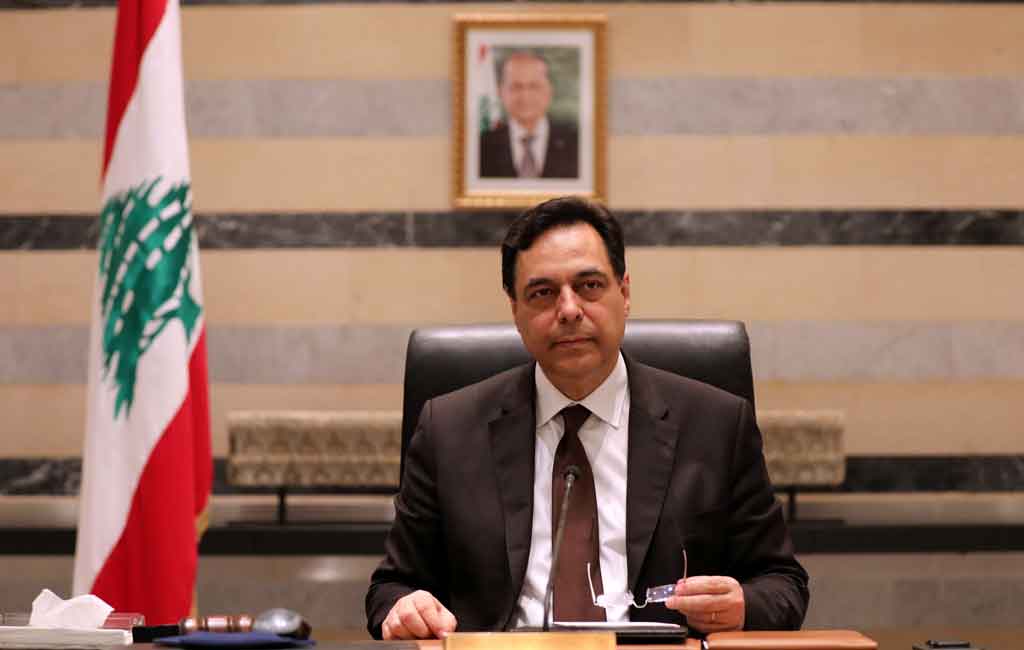SAMI
Published:2020-08-11 11:21:53 BdST
Lebanese PM resigns amid fury over Beirut blast
Lebanon's prime minister announced his government's resignation on Monday, saying a huge explosion that devastated the capital and stirred public outrage was the result of endemic corruption.
Seven days into powerful explosions at the port of the city of Beirut killing 220 people and maiming 7,000 others, he resigned surprisingly on Monday.
In a televised address, Prime Minister Hassan Diab said he backed calls by ordinary Lebanese for those responsible for "this crime" to be put on trial.
“Today we follow the will of the people in their demand to hold accountable those responsible for the disaster that has been in hiding for seven years,” Prime Minister Hassan Diab said in a speech announcing the resignation.
His announcement came several hours after hundreds of youths overran protest sites in downtown Beirut, ransacking tents and stalls set up by demonstrators who, for the past 13 days, have demanded an overhaul of the ruling class and an end to rampant corruption.
Diab made the announcement after the cabinet, formed in January with the backing of the powerful Iranian-backed Hezbollah group and its allies, met on Monday, with many ministers wanting to resign, according to ministerial and political sources.
Diab said on Saturday he would request early parliamentary elections.
He blamed the disaster on endemic corruption and said those responsible should be ashamed because their actions had led to a catastrophe “beyond description”.
“I said before that corruption is rooted in every lever of the state but I have discovered that corruption is greater than the state,” he said, pointing to a political elite for preventing change and saying his government faced a brick wall on reforms.
Demonstrations broke out again in central Beirut, with some protesters hurling rocks at security forces guarding an entrance leading to the parliament building, who responded with tear gas.
"The entire regime needs to change. It will make no difference if there is a new government," Joe Haddad, a Beirut engineer, told Reuters. "We need quick elections."
The embattled leader said he intended to make a “positive shock” by quitting, claiming that doing so served “the country’s dignity and safety”. Over the past fortnight, he has tabled reforms, including the abolition of several cabinet positions and some cuts to spending, but the moves have fallen short of the structural changes demanded by protesters.
The protests have left politicians scrambling unsuccessfully to react and have exposed the depth of feeling in Lebanon, where an imminent economic collapse threatens to cripple the country’s banking system and social fabric.
The depth of the crisis and lack of political solutions have galvanised Lebanese citizens from all political persuasions and walks of life, leading to a movement that shows little sign of slowing down, even after the main protest site was ransacked on Tuesday.
For many ordinary Lebanese, the explosion was the last straw in a protracted crisis over the collapse of the economy, corruption, waste and dysfunctional governance, and they have taken to the streets demanding root-and-branch change.
The information and environment ministers quit on Sunday as well as several lawmakers, and the justice minister followed them out the door on Monday.
Finance Minister Ghazi Wazni, a key negotiator with the IMF over a rescue plan to help Lebanon exit a financial crisis, was set to resign, a source close to him said.
Lebanon's president had previously said explosive material was stored unsafely for years at the port. He later said the investigation would consider whether the cause was external interference as well as negligence or an accident.
On August 4, two explosions occurred at the port of the city of Beirut, the capital of Lebanon. The extremely powerful second blast resulted in at least 220 deaths, 7,000 injuries, and US$10–15 billion in property damage, and made an estimated 300,000 people homeless.
ACCOUNTABILITY
The Lebanese army said on Monday that another five bodies were pulled from the rubble, raising the death toll to 163. Search and rescue operations continued.
The cabinet decided to refer the investigation of the blast to the judicial council, the highest legal authority whose rulings cannot be appealed, a ministerial source and state news agency NNA said. The council usually handles top security cases.
Anti-government protests in the past two days have been the biggest since October, when angry demonstrations spread over an economic crisis rooted in pervasive graft, mismanagement and high-level unaccountability.
An international donor conference on Sunday raised pledges worth nearly 253 million euros ($298 million) for immediate humanitarian relief, but foreign countries are demanding transparency over how the aid is used.
Some Lebanese doubt change is possible in a country where sectarian politicians have dominated since the 1975-90 conflict.
"It won't work, it's just the same people. It's a mafia," said Antoinette Baaklini, an employee of an electricity company that was demolished in the blast.
Unauthorized use or reproduction of The Finance Today content for commercial purposes is strictly prohibited.


